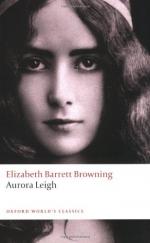|
This section contains 315 words (approx. 1 page at 400 words per page) |

|
Aurora Leigh Summary & Study Guide Description
Aurora Leigh Summary & Study Guide includes comprehensive information and analysis to help you understand the book. This study guide contains the following sections:
This detailed literature summary also contains Bibliography on Aurora Leigh by Elizabeth Barrett Browning.
As early as 1844, Elizabeth Barrett wrote Robert Browning that she was thinking about writing a novel in verse form on modern themes. Several years later, she began work on Aurora Leigh (1857), which turned into one of the longest poems in the English language in its number of lines. Browning thought it her most mature work, and it turned out to be her biggest commercial success. Aurora Leigh deals with some of the major social problems of her age, particularly the difficulty of being a professional woman. There is a frank treatment in the story of the fallen woman in an effort to show an unwed mother as a victim and not necessarily someone to be condemned, as was the Victorian practice. The poem also reveals a distrust of socialist theory, in that Browning feared that communist-style communities would exclude artists and poets.
Aurora Leigh elicited much praise from the public and other poets, but professional reviewers found it coarse, vulgar, and highly flawed. Even those who admired the work found deficiencies and inconsistencies, while those who decried the book admitted that the attempt showed genius. Undeniably, Aurora Leigh was one of the most avant-garde publications of its day. A progressive thinker, Browning was also definite about her morality and the joy that romantic love had brought to her. Thus, this largely autobiographical poem does not discuss prostitution lightly, and the liberated poet decides in the end that the pursuit of one's art cannot bring to a woman's life the satisfaction found in an enduring, loving marriage. Modern readers of Browning are more familiar with her romantic poetry, particularly Sonnets from the Portuguese, her love lyrics to her husband. However, as evidenced by a 1996 Norton publication of Aurora Leigh, edited by Margaret Reynolds, feminist scholarship has resurrected interest in this verse novel and promoted a new appreciation of the talent and intellect of Browning.
Read more from the Study Guide
|
This section contains 315 words (approx. 1 page at 400 words per page) |

|



